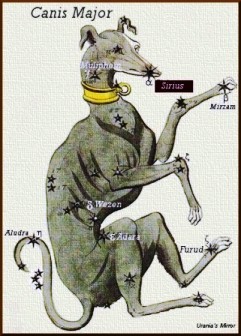 We are in “the dog days of summer”.
We are in “the dog days of summer”.
This phrase, for what is supposed to be the hottest part of the summer, believed by the ancients to be a time of bad omens, stems from the name of the bright star seen well at this time of year, Sirius (from Greek seirios, “blazing, scorching”). Sirius is called the “Dog Star”, because it is part of the canine constellation, Canis Major, which follows Orion the Hunter up into the sky at this time of year in the Northern Hemisphere. For your Tolkien fans, Orion is “Menelvagor with his shining belt”. Those of you who have satellite radio from Sirius now know why the logo involves a little dog.
For the ancient Romans the Dog Days began on 24 July. They would sacrifice a brown dog with the hope that the season wouldn’t be too hot or bring diseases. I would happily sacrifice a particularly annoying little brown dog I know of, as a matter of fact. I digress. Long before the Romans paid attention to Sirius, nisi fallor, the Egyptians used its rising to anticipate the all important flooding of the Nile. The Dog Days ended for the Romans on 24 August. Due to your planet’s axial precession, the date of the dog days has shifted over time.
I wonder if there is a connection between the Jetson’s dog, Astro and…. No. Probably not. But there may be a connection between Sirius Black and the Dog Star, since Sirius could shift-shape into a dog. I digress.
If you fall under the baleful effects of the Dog Star, you are said to be astroboletus,”star struck”, which probably means you are besotted with love or otherwise in a burning or flaming passion.
 My favorite among the ancient Roman poets of the golden age, Q. Horatius Flaccus, Horace, has a delightful poem about the fresh running spring near his country home, his getaway from the chaos of Rome, which through the ages has been nicknamed his “Sabine Farm”. He mentions these canicular days.
My favorite among the ancient Roman poets of the golden age, Q. Horatius Flaccus, Horace, has a delightful poem about the fresh running spring near his country home, his getaway from the chaos of Rome, which through the ages has been nicknamed his “Sabine Farm”. He mentions these canicular days.
O fons Bandusiae splendidior uitro,
dulci digne mero non sine floribus,
cras donaberis haedo,
cui frons turgida cornibusprimis et uenerem et proelia destinat.
Frustra: nam gelidos inficiet tibi
rubro sanguine riuos
lasciui suboles gregis.Te flagrantis atrox hora Caniculae
nescit tangere, tu frigus amabile
fessis uomere tauris
praebes et pecori uago.Fies nobilium tu quoque fontium
me dicente cauis impositam ilicem
saxis, unde loquaces
lymphae desiliunt tuae.
I believe I once recorded this poem in Latin for a PODCAzT.
For those of you whose Latin is not up to this poem (not my translation):
O Bandusian fountain, brighter than crystal,
worthy of sweet wine, not lacking in flowers,
tomorrow we’ll honour you
with a kid, whose brow is buddingwith those horns that are destined for love and battle.
All in vain: since this child of the playful herd will
darken your ice-cool waters,
with the stain of its crimson blood.The implacable hour of the blazing dog-star
knows no way to touch you, you offer your lovely
coolness to bullocks, weary
of ploughing, and to wandering flocks.And you too will be one of the famous fountains,
now I write of the holm oak that’s rooted above
the cave in the rock where your
clear babbling waters run down.
One of my Latin profs in grad school told me that you don’t really appreciate Horace until you are a little older. That was 30 years ago, and I understand what he meant.
I have visited Horace’s villa several times, with groups of friends and Latin students. We brought goodies for a picnic and chilled bottles of white wine in the spring’s pool and read Horace in Latin, shaded from the sun, surrounded by cicadas and flaming poppies.
Perhaps you might sacrifice a goat tomorrow evening, or alternatively a dog, and then roast it slowly over a fire of dried cutting from your vineyards and orchards, and then consume it with friends and large quantities of the red wine he also mentions.


































“Perhaps you might sacrifice a goat tomorrow evening, or alternatively A DOG, and then roast it slowly over a fire of dried cutting from your vineyards and orchards, and then consume it with friends and large quantities of the red wine he also mentions.”
Sounds like a picnic on the White House lawn.
“Dog Day” is today’s OED Word of the Day –
http://www.oed.com/viewdictionaryentry:showfullentry/true?t:ac=Entry/56426
Doesn’t sound like the brown dog’s demise would be much of a sacrifice for you, but rather that the dog’s continuance is a bit of a mortification.
Orion is also called “Strider” which is where Tolkien got the nickname for Aragorn. I love Canis Major and Orion and have written some poems on them. Orion is also an ancient symbol for Christ, as when Orion is high in the sky, is it Christmas. His dog comes up now, almost like a forerunner.
As to the Dog Days, one can feel it here, and for hundreds, and maybe over a thousand years, Londoners have vacated London in these days, as it gets hot and muggy. As I am in London, I can only see very few stars, but Sirius is one of them. One reason I would not want to live here, is that I am a stargazer and miss the country sky.
The Dog Days in Europe were traditionally seen as the time of sin and danger, as one can imagine without too much trouble. Laziness and heat combined to create an atmosphere of sexual laxity.
Father, I agree with you that Horace is a poet for older people, just as Ovid is for the young. I am envious that you have been to his villa. Nice.
Here is my poem: To Sirius
The dog runs without its master
looking at the small earth beneath
a dot in the universe, hot and cold
but full of life
Even in August, one feels the age
of summer draining, straining, as
the last harvests reach out to the skies
in hope
As I watch the Dog Star, I seek for
more rain, more energy, more life
than is given in the dank nights
forbidding sleep
How little I am, Sirius, as you
lead me on to the One who made
both of us-you the brightest in
the firmament and me
One of the smallest, and yet
as I strain to see you through
the mist and clouds, I know
we have the same Master.
Supertradmum,
Thanks for the poem. We’re in much the same boat in greater metro Atlanta, too much haze and light pollution to see anything. I love going to my parents’ house on the remote Georgia coast – you can actually see the Milky Way from horizon to horizon with the naked eye.
I wish I could read Horace in the original, but the best I can do is Kipling’s short story “Regulus”.
Of course Sirius was a natural for the name of our Dog Agility training club:
Sirius Dog Agility
AmericanMother, There will be two more poems on my blog tomorrow, or 7 your time. I am in a happy mood today and I write when I am happy.
AnAmericanMother, love the pun
Neat post, Father.
I appreciate all of the above waxing lyrical, but Father, I find your lack of faith….er….dog appreciation disturbing : ) !
I’d rather sacrifice a rooster – a particular rooster, actually. I’m afraid my neighbor, owner of the offending animal, would disagree though…
Is there a blessing of foxes?
Mariana: Do you mean “lack of Fido”?
Father Z., I presume you are using “sacrifice” in a non-technical sense! As you probably recall, Francis Parkman has a striking account in The Oregon Trail (1847) about how he brought a particularly annoying dog to be a signal feature of a feast on one occasion (without, so far as I know, sacrifice – in any sense – being involved).
I’ve never tried dog, myself – and from what I read about its current popularity in China and South Korea, it does not sound particularly appetizing (in contrast to horse, which I have often enjoyed in my Continental European peregrinations, though the thought dismays many in the English-speaking world).
I was just wondering before reading this post whether the presumably emphatically ‘pagan’ choice of “Sirius” by Pappa and Mamma Black had any Christian dimensions that eluded them, as (Providentially, I take it) “Regulus” being a saint’s name did…
Speaking of Tolkien and dogs, anyone who had not yet tried ‘Roverandom’ (ed. C. Scull and W.G. Hammond, 1998) is missing a treat (though I do not recall if any Orion-Canis Major play comes into its extra-terrestrial fun)!